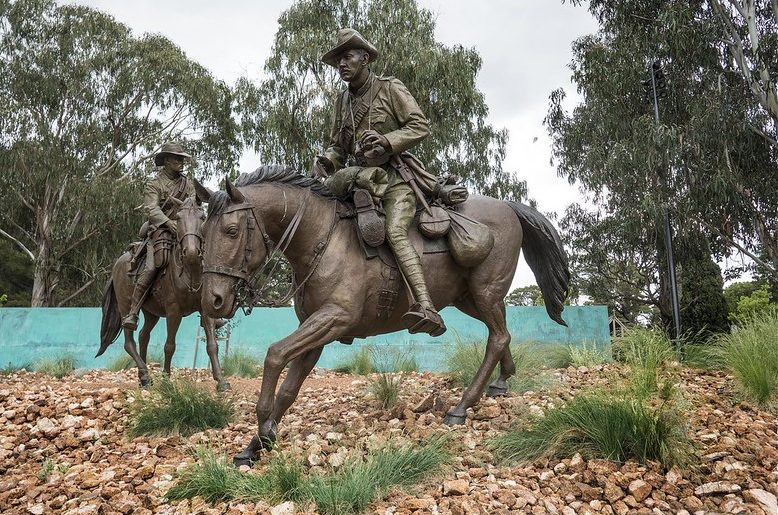
When Australia became a nation on 1 January 1901, it was at war in South Africa and China.
The six Australian colonies had sent militia and bushmen contingents to the Boer War (1899–1902) and dispatched troops and ships to the Boxer Rebellion (1900–01).
The Commonwealth of Australia was blessed with its own continent and the most peaceful act of national creation. The federation was formed by agreement and referendum. Yet the Commonwealth inherited a foreign military tradition at its birth.
The first military unit established by the new federal government was the ‘Australian Commonwealth Horse’, which served in the final stage of the South African conflict. They were the first Australian troops to wear the rising sun badge, clipping the brim of the slouch hat. One of Australia’s most questionable fights, the Boer War, has one of Canberra’s most striking memorials—a patrol of four mounted soldiers edging their bronze horses down a slope to Anzac Parade.
The memorial has a verse from the journalist-poet Banjo Patterson, who served as a correspondent in South Africa:
When the dash and the excitement and the novelty are dead,
And you’ve seen a load of wounded once or twice,
Or you’ve watched your old mate dying—with the vultures overhead,
Well, you wonder if the war is worth the price.
Patterson’s ‘worth the price’ question often recurs in considering the nine times Australia committed to war in the 90 years from 1914 to 2003. What he reported as an imperial war would become alliance wars. The distinction between wars of choice and wars of necessity is fraught, yet the Boer War counts as our first war of choice—Vietnam and Iraq are later additions to that column.
Australia goes abroad to fight for its alliance, to help set the central balance, and for what we now call the rules-based global order. We send our diggers offshore. Statecraft meets strategy as the expeditionary force sets out.
Australia has spent much of its history, as Coral Bell masterfully recounted, as a ‘dependent ally’, but it is a finely calculated reliance. Dissecting Australia’s strategic culture and way of war, Michael Evans observed that our pragmatic politics meant this ‘dependency has always been clever, cynical and calculated’.
The Boer War heralded another constant in the way the nation goes to war—the lack of any initiating role for the federal parliament. When Australian troops first sailed for South Africa, parliament didn’t even exist. In every war since, it has been the ghost with no formal voice in the most fundamental choice a nation can make. The executive has almost unfettered war powers.
The prime minister declares the deployment or announces the conflict and the military march. This is the leader’s most profound prerogative. The prime minister confident of cabinet and party can act without any authorisation or resolution from the parliament.
All this frames the just-announced parliamentary inquiry into ‘how Australia makes decisions to send service personnel into international armed conflict’. The review will wrestle with issues that echo down our 120 years of federation.
Previous pushes to give parliament a voice over war powers have come from minor parties in the Senate—the Australian Democrats and the Greens. This time, the discussion has been set in motion by a new government.
Prime Minister Anthony Albanese’s government is acting on the platform it took to the May election. Under the heading ‘Armed conflict’, the Australian Labor Party’s national platform conference resolved:
that an Albanese Labor Government will refer the issue of how Australia makes decisions to send service personnel into international armed conflict to an inquiry to be conducted by the Joint Standing Committee on Foreign Affairs, Defence, and Trade.
The terms of reference set by Defence Minister Richard Marles ask the inquiry to consider:
- the approach of similar Westminster-system democracies around the world
- parliamentary processes and practices, including opportunities for debate to provide greater transparency and accountability on the deployment of the Australian Defence Force
- the security implications of prenotification of ADF deployment that may compromise the safety of ADF personnel, operational security or intelligence and/or have unintended consequences
- any related matters.
The terms of reference point to the inevitable tensions: secrecy and security versus what a democracy needs from its parliament. I’ve written a series of columns on the prime minister’s profound prerogative and the Australian way of war. My minimalist solution is not to push against executive powers, but to formalise conventions to ‘parliamentise’ the war powers.
Aim for a checklist if not a legal check when war is launched. And use the checklist for greater parliamentary oversight of the way war is waged. Over the past two decades, prime ministers as diverse as John Howard, Tony Abbott and Julia Gillard have offered footholds on which parliament could build conventions.
A greater role for parliament will respond to seismic shifts in Australian politics. The two ‘parties’ of government—Labor and Liberal–National—must adjust to the change in the way Australians vote.
John Howard defines that shift in his new book:
When I first became active in politics in the early 1960s, what I described as the 40–40–20 rule obtained. This meant 40% always voted for the ALP, 40% for the Coalition, and 20% floated between the two, or voted for minor parties or independents. In recent years, I have commonly remarked that the old 40–40–20 rule has been replaced by a 30–30–40 rule.
At the May election, Howard’s new equation ‘came remarkably close to reality’—one-third of the primary vote went to Labor, one-third went to the Coalition, and the rest went elsewhere. The preferential system means ‘Australia remains firmly with the two-party paradigm’ in forming government, as Howard notes.
In that 30–30–40 world, the relationship of the executive to parliament will alter. We will have more minority governments in the future than we’ve had in the past.
In that future, the prime minister’s prerogative for war must, at the least, nod to the views and voice of the parliament.

